Affiliate links on Android Authority may earn us a commission. Learn more.
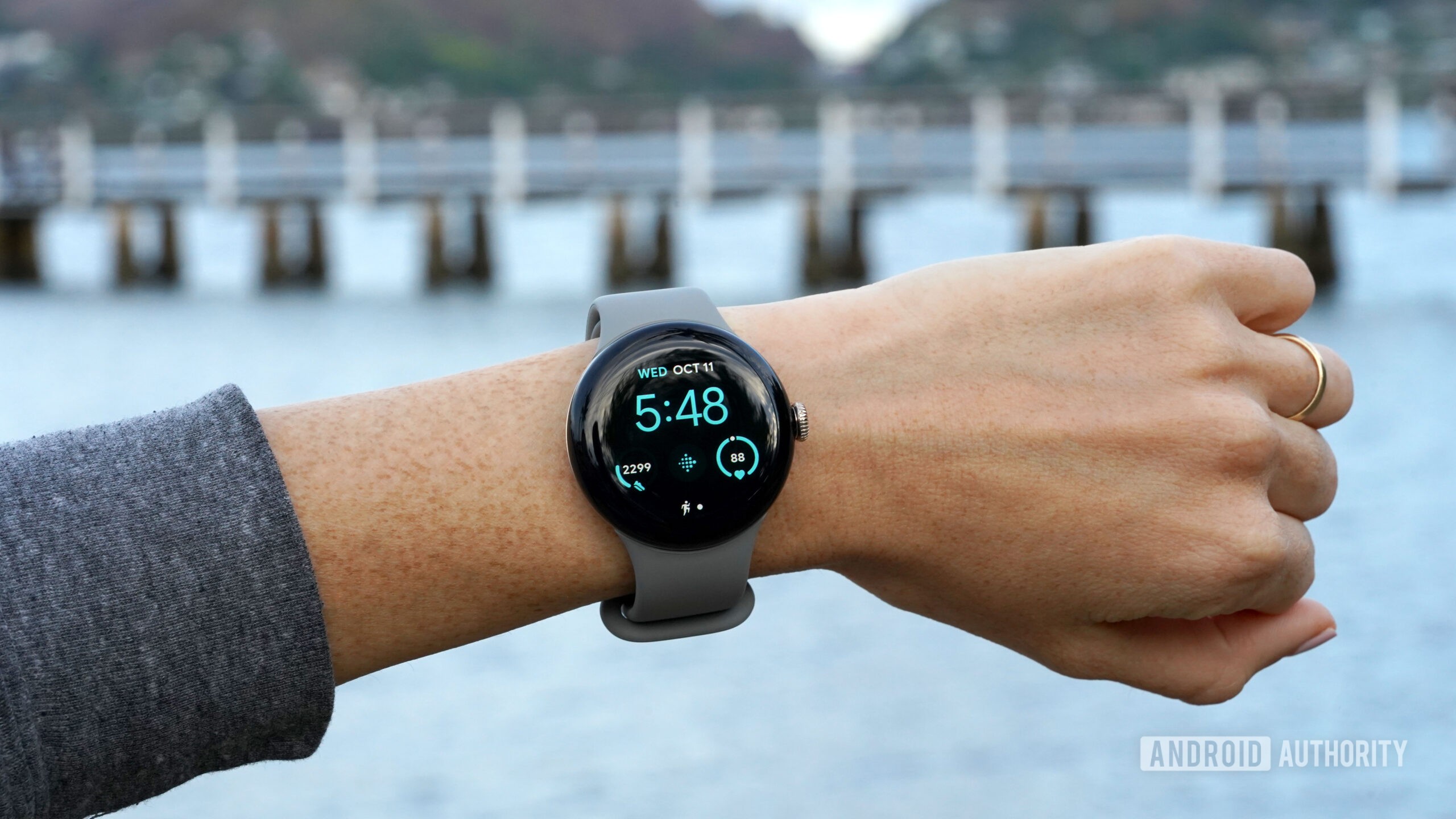
Google Pixel Watch 2
MSRP: $349.99
What we like
What we don't like
Google Pixel Watch 2
If the original Pixel Watch was Google’s rough draft, the Pixel Watch 2 is an edited version much more than a complete rewrite. Google gave hopefuls a solid enough first-generation smartwatch, but it desperately needed refinement to smooth off the rougher edges. The Pixel Watch 2 cleans up some of the original’s mistakes with simple, effective upgrades and key additions, but is it good enough to keep with the best smartwatches? Find out in this Pixel Watch 2 review.
Google Pixel Watch 2 review: At a glance
- What is it? The Google Pixel Watch 2 is the successor to Google's first-ever smartwatch which launched in 2022. The new device features many of the same design specs as the original but adds new health monitoring tools, including an upgraded multi-path heart rate sensor, EDA sensor, and new temperature sensor. The watch also runs the company's latest Wear OS 4 out of the box and builds on the line's thorough Fitbit integration.
- What is the price? The Google Pixel Watch costs $349 for a Wi-Fi-only model. Opting for an LTE version runs an additional $50.
- Where can you buy it? You can purchase a Google Pixel Watch 2 now from Google, Fitbit, or third-party retailers such as Amazon.
- How did we test it? I tested the Google Pixel Watch 2 for six days. The review unit was supplied by Google.
- Is it worth it? The Google Pixel Watch 2 offers shoppers a more refined product compared to its predecessor and does a much better job competing within the wearables market. Its health and fitness tracking suite provides useful, accurate data, Wear OS 4 runs smoothly and boasts powerful features, and the watch's improved battery and charging specs make for a less cumbersome user experience. It's by no means a perfect device, and Google still has a ways to go before standing toe to toe with Apple, but the attractive Pixel Watch 2 is worthy of consideration. For anyone interested in a Fitbit smartwatch, it's a no-brainer.
What I like about the Google Pixel Watch 2
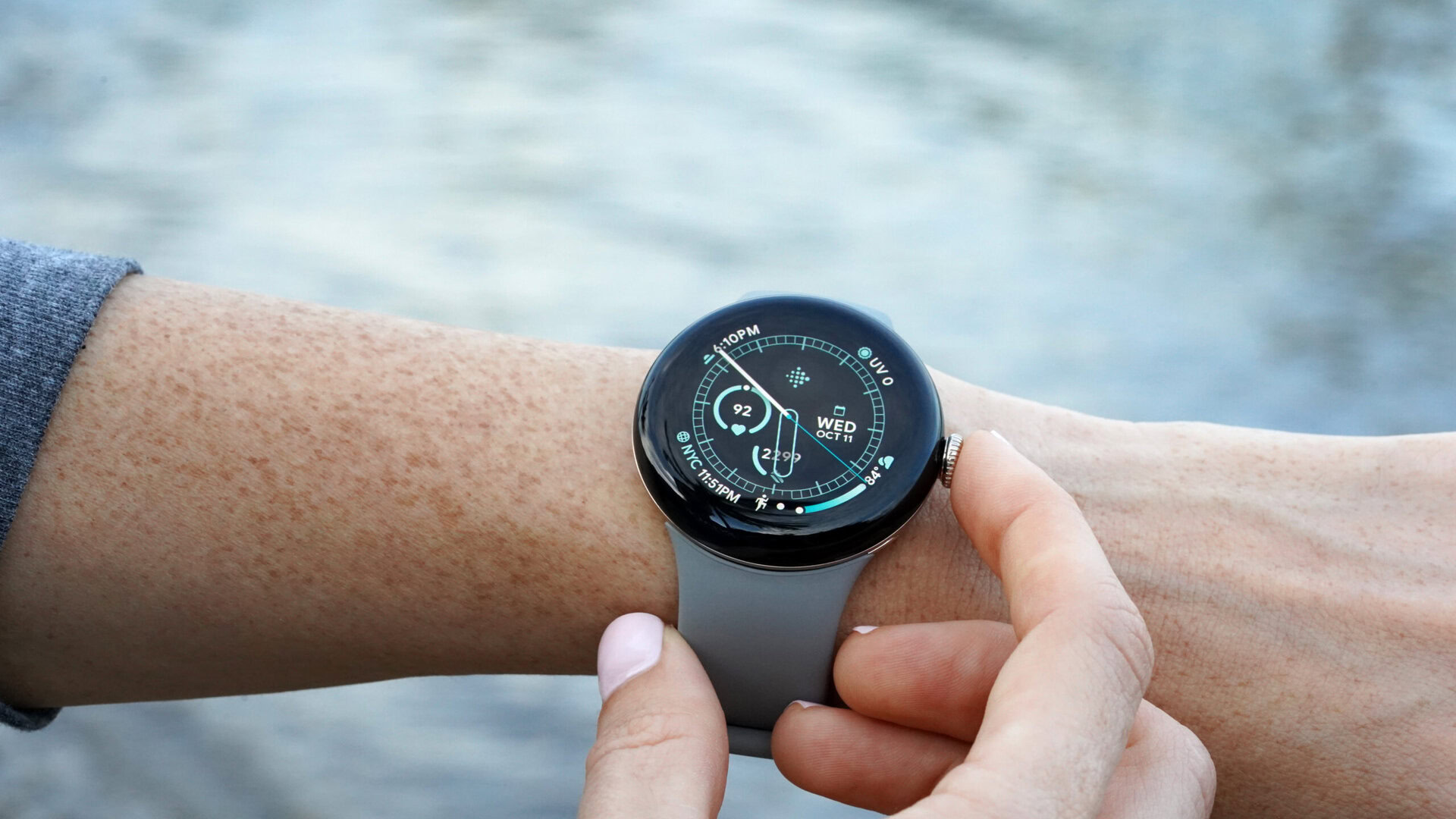
Like a term paper filled with a professor’s red pen, the original Google Pixel Watch faced a lot of critique. To be fair, most first drafts do. The Google Pixel Watch 2 builds on the original’s solid outline with key improvements and new additions. It also keeps certain features, like its minimalist aesthetic, exactly the same.
I still like the overall look of the Pixel Watch 2, including its uniquely curved glass and seamless band attachments. The case remains 41mm with a 1.2-inch display, but Google boosted the size of the device’s digital crown for smoother spinning. Additionally, though the band mechanism is unchanged, it no longer bothers me as thoroughly as it did last year.
Each watch ships with a solid sport band, though Fitbit also released a perforated one (sold separately) that’s meant to provide extra breathability during workouts. Both designs are soft to the touch and highly adjustable. Personally, I don’t like that the perforated one has two different hole sizes, but I realize this is a very niche opinion. Regardless, I’ve stuck with the solid strap. Google also launched a variety of new bands in other materials, including a slim metal one that’s elevated and perfect for slim wrists.
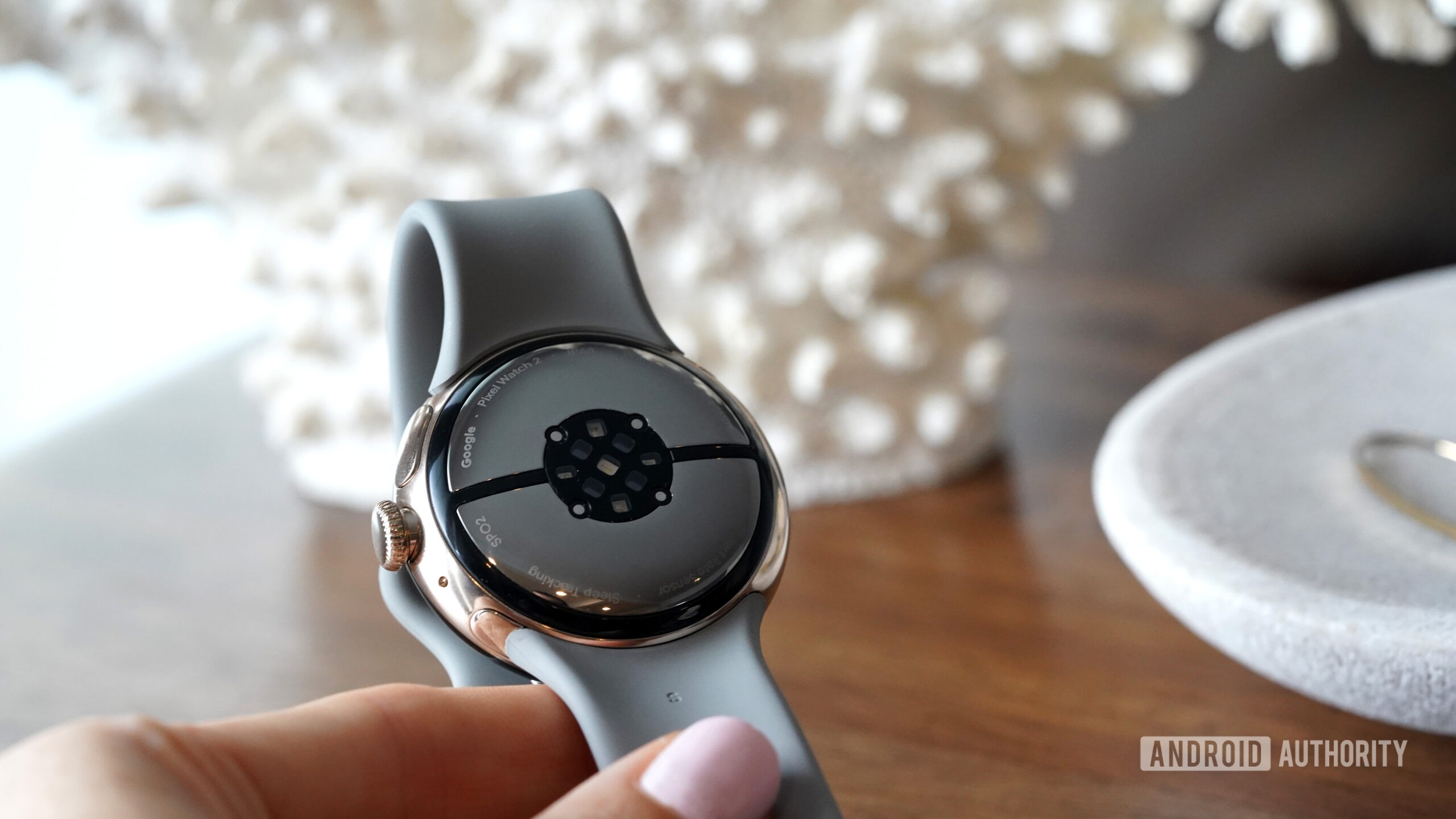
Flipped over, the watch boasts two new advanced health sensors and an SpO2 sensor that, unlike the original Pixel Watch, is active out of the box. To be frank, I am not overly impressed with how the new sensors are currently put to use, but I’m happy to see them added nonetheless. The first is a skin temperature sensor different from last year’s. It’s better tech with higher potential; I just can’t understand why there isn’t a menstrual cycle tracking feature to leverage the hardware.
The second is a skin dermatological sensor for powering Fitbit’s Body Response feature. This is a feature ported over from the Fitbit Sense 2. I’ll touch on this addition more below, but the indication that Google wants the Pixel Watch line to pack the best health tools Fitbit has to offer is a great sign, even if doesn’t bode well for Fitbit’s in-house smartwatch lines.
Also on the back side, users will notice four spots for the device’s pogo pin charger to align. A new cable ships with each watch and provides much faster charge times than the previous model. Charging the watch from zero to 100% took a little over an hour (almost a full 30 minutes less than the original model), and charging to 50% took me 25 minutes. The charger won’t work with the first Pixel Watch, and in fact, the first generation watch now charges even slower than ever after a controversial software update.
More usefully, perhaps, topping up meaningfully takes less time than a quick rinse. After each workout, I dropped my watch on its charger to bank battery life while I showered. Now, just 15 minutes on the plug gains 20% battery, enough to go to sleep without worrying about losing overnight stats.
Additionally, unlike its predecessor, Google’s second-generation device actually provides 24 hours of power between charges, even with its always-on display enabled — a feat the Pixel Watch could only manage with careful nurturing and tactical use of battery saving modes. With my display on, a 40-minute GPS workout, and moderately high usage, my watch lasted just under 25 hours. Tracking sleep overnight, it drops about 10%. Honestly, I wanted to see Google bump the device’s battery up further, but I’ll take progress. The watch still can’t compete with the Garmin Venu 3, but it’s gaining on the Apple Watch.
The Pixel Watch 2 owes its power efficiency to the Wear OS 4 platform running on Qualcomm’s Snapdragon W5 chip with a new quad-core CPU. Just like with the first Pixel Watch, the user experience is smooth and speedy, with no lagging or glitching to speak of. New watch faces display bold colors and well-designed data fields. Skimming through tiles or spinning through menus is seamless, apps open quickly, and Google’s top tools add up to a powerful device.
The Calendar app and Gmail app are welcome additions, and as my colleague Rita El Khoury discovered, you can now use the location of a Calendar event to navigate within Google Maps. Unfortunately, the watch still doesn’t support public transportation routes. This is a frustrating oversight and, for me, makes the watch much less useful when traveling as I rely heavily on buses and trains. At least I can check my Gmail while I’m lost on a random route, I guess.
Google's top tools continue to shine with the latest Wear OS 4 platform running on a powerful processor.
Meanwhile, a new Google Assistant tile lets you add two shortcuts for frequently used requests. Google Assistant can also query personal stats like step count or sleep duration when you don’t feel like navigating to your health details. Apple announced a similar feature on its own devices, but it won’t be available for some time.
These highlights are just a sampling of the features available via Wear OS 4. Much of the rest of the platform should look familiar to Wear OS 3 users, and I’m happy with that. Between the Play Store for third-party apps and Google’s apps, the Pixel Watch line has a lot to offer. Since it’s spooky season, I really enjoyed using the watch’s miniaturized Google Home app to nonchalantly flicker lights and creep out my partner.
Wear OS 4 also now offers device backup, restore, and transfer. This means you can easily swap your watch to a new phone without losing data or settings. Likewise, you can also save all of your watch’s settings and data to restore to a new wearable. I couldn’t test this feature yet as Wear OS 4 hasn’t yet rolled back to the original Pixel Watch, but it will definitely make Wear OS device ownership more convenient.
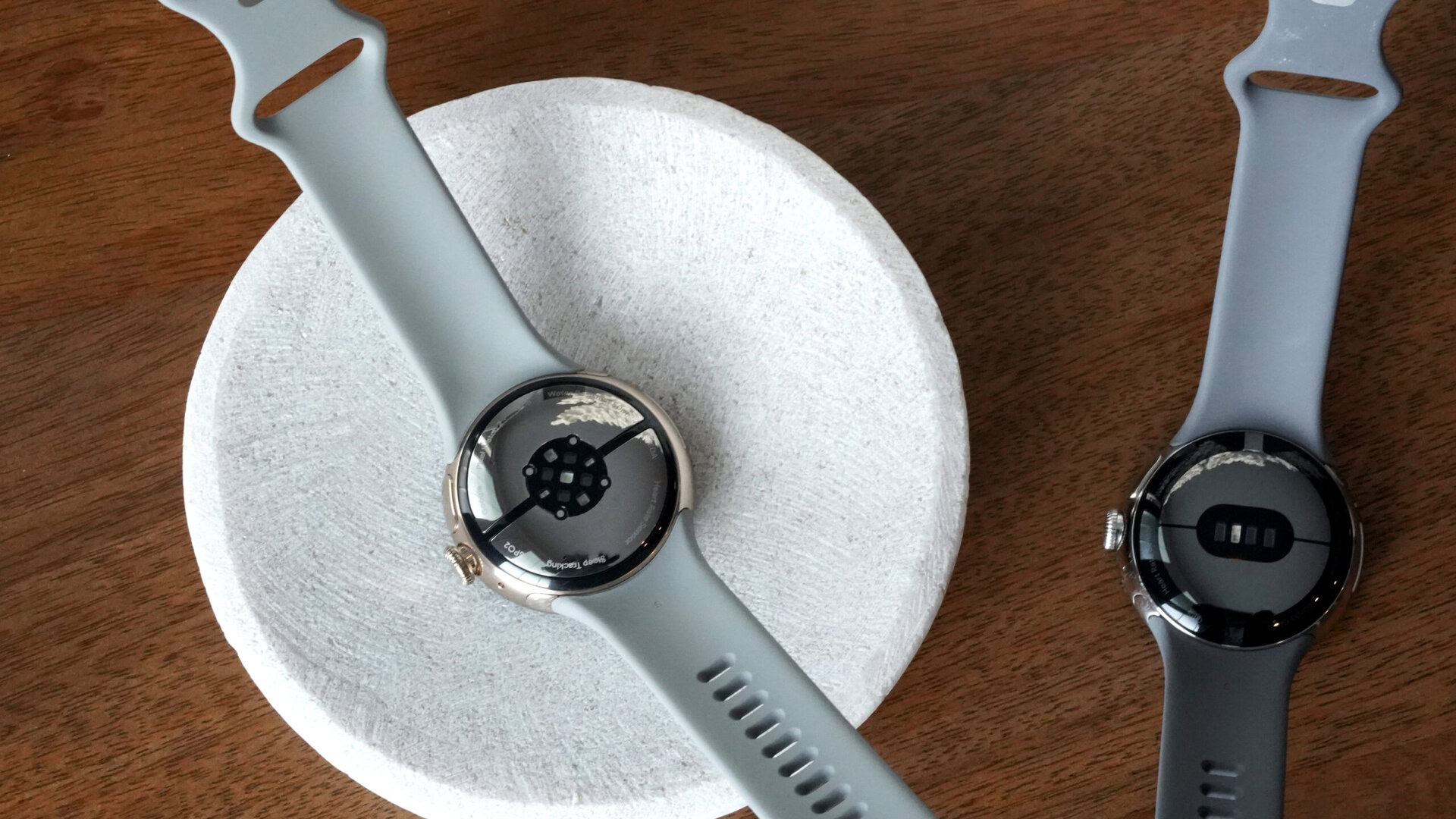
Just as Google’s tools make a welcome return, Fitbit’s ecosystem remains a pillar of the Pixel Watch experience. The device effectively tracks all the same basic health and fitness metrics as its predecessor, adding more tools and refinement as needed. I was very excited to see the watch now automatically detects seven popular workouts. I tested the automatic detection of walking and running this week, and both were identified and recorded perfectly. In fact, I was generally very pleased with the watch’s activity tracking, including heart rate and GPS tracking, and the addition of useful training tools.
To drop back into my term paper metaphor, when it came to heart rate accuracy, the original Pixel Watch aced the assignment. The watch kept up with comparable wearables and my dedicated chest strap. Still, Google didn’t rest on its laurels this year. Instead, the Pixel Watch 2 features an even more powerful multi-path heart rate module that spaces out five photodiodes and five LEDs for more accurate readings. Plus, in addition to the return of ECG readings, the watch also adds irregular rhythm notifications. Once you also consider the device’s new training zone features below, it’s clear Google is after your heart.
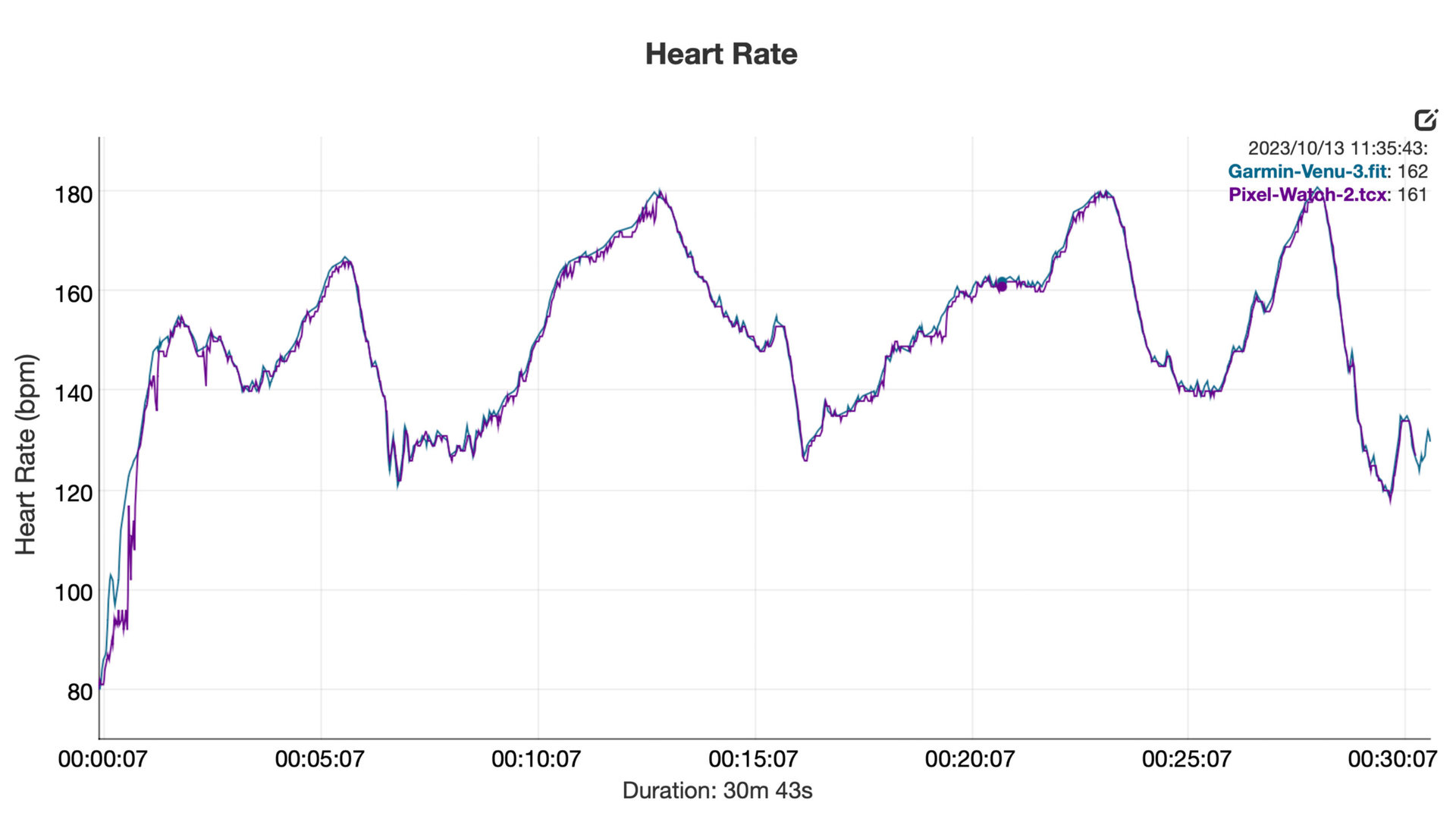
First, though, let’s talk accuracy. Much like its predecessor, the Google Pixel Watch 2 proved reliable in recording both resting and active heart rates. The chart above shows one of many workouts during which the watch put up stats respectably close to my Polar H10 chest strap. You can see the watch experience a slight delay locking on at the beginning but then nailed my peaks and valleys. During stable tests like indoor cycling and trickier workouts like interval runs and weight lifting, I was pleased with the Pixel Watch 2’s performance.
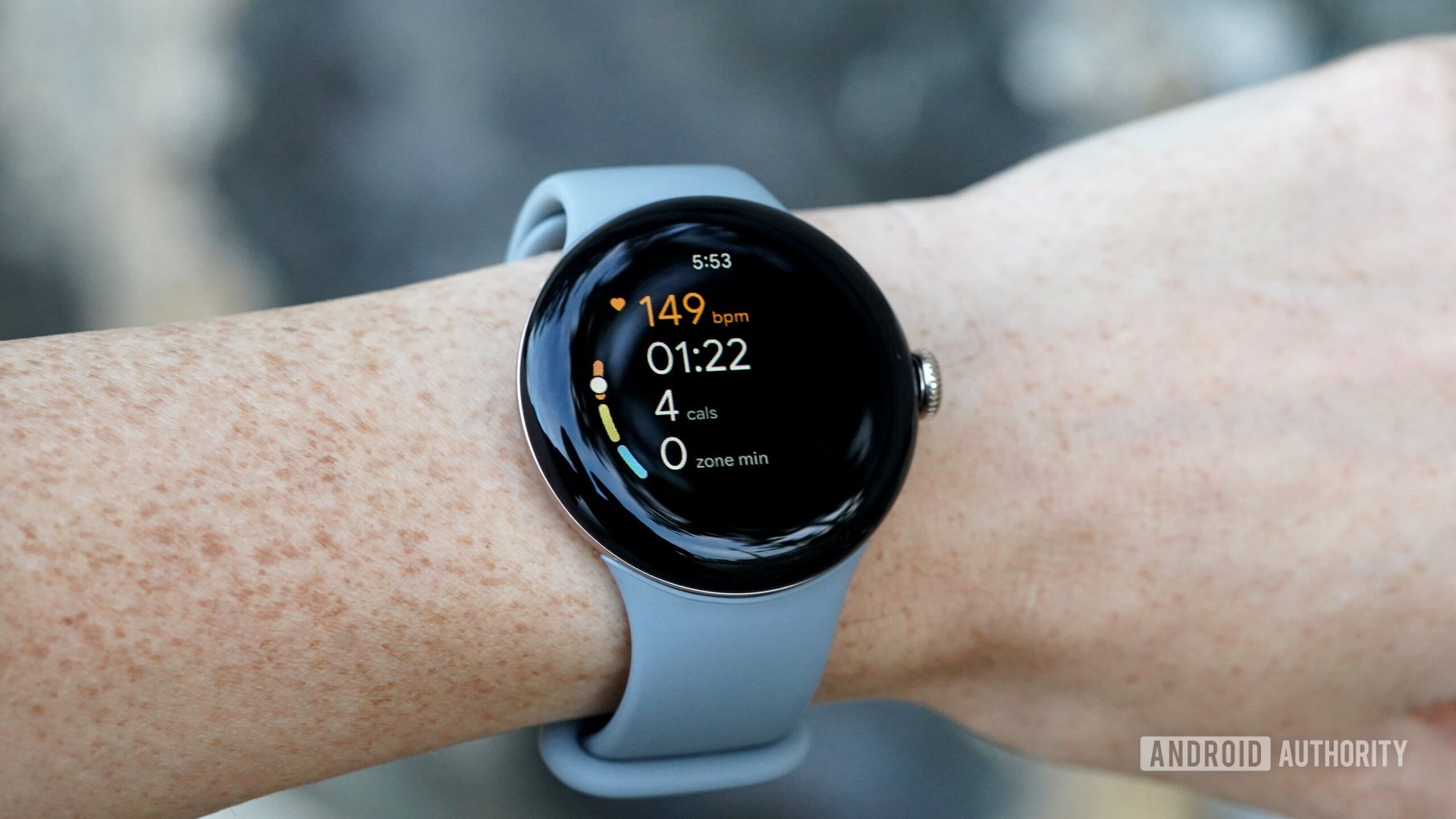
Where the heart rate sensor shines for me is in the addition of displayed heart rate zones during workouts. I am sincerely motivated by this kind of real-time feedback, especially during grueling interval runs. For those charged by the clock (presumably users much faster than me), Google also added pace zones as well. Either way, you can now set personalized goals and monitor your performance on-device mid-workout. This type of training feedback isn’t new to wearables, but it’s a good sign that Google wants the Pixel Watch line to be a serious option for athletes.
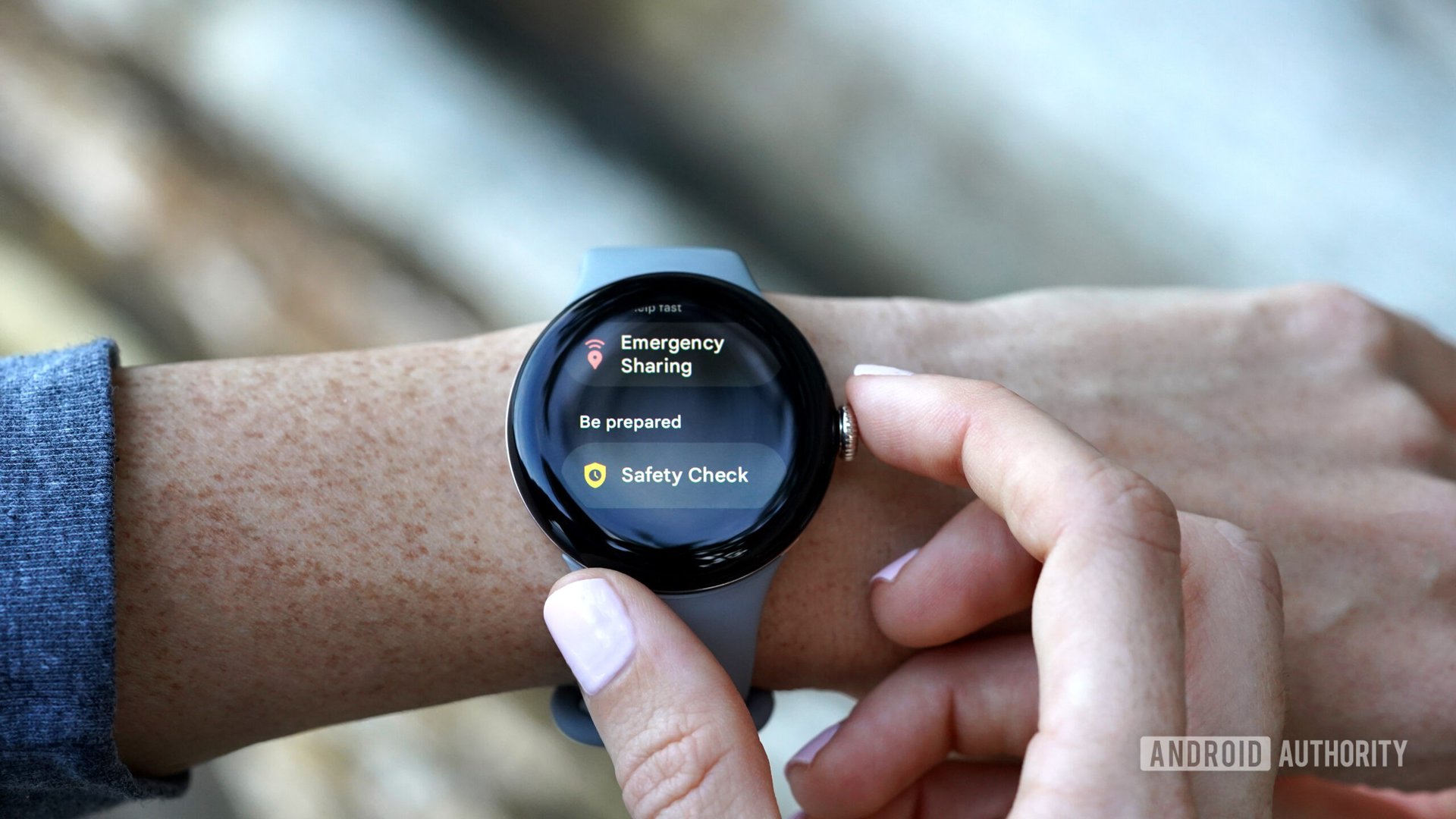
I am very happy to see more safety features have been added to the Pixel Watch 2. If I’m going to wear something 24/7, it might as well give me a sense of security, and not the false kind that wearing backpacks gives me. Safety Check is a feature I love and have talked about at length with friends. Also found on Pixel phones, the feature lets you set a timer before heading into a potentially sketchy situation. If you fail to check in when the time runs out, the watch automatically sends your location to chosen contacts.
Personally, I can imagine a wide range of scenarios I would use the feature in, from running at night to meeting a stranger to pick up an unnecessary but fantastically cheap Facebook Market find. Others have mentioned how the feature makes the watch an attractive holiday gift idea for a daughter in college or a husband newly interested in cycling. During testing, Safety Check worked as expected; I only wish it were usable on non-LTE models without a paired phone nearby.
I would also love to see emergency sharing expanded to live location sharing. Sometimes it’s nice to share your location without preemptively labeling it as an emergency (feels like jinxing it, doesn’t it?). If I’m going out for a solo hike, I wouldn’t hate if someone could keep tabs that I don’t stumble down the mountain.
What I don’t like about the Google Pixel Watch 2
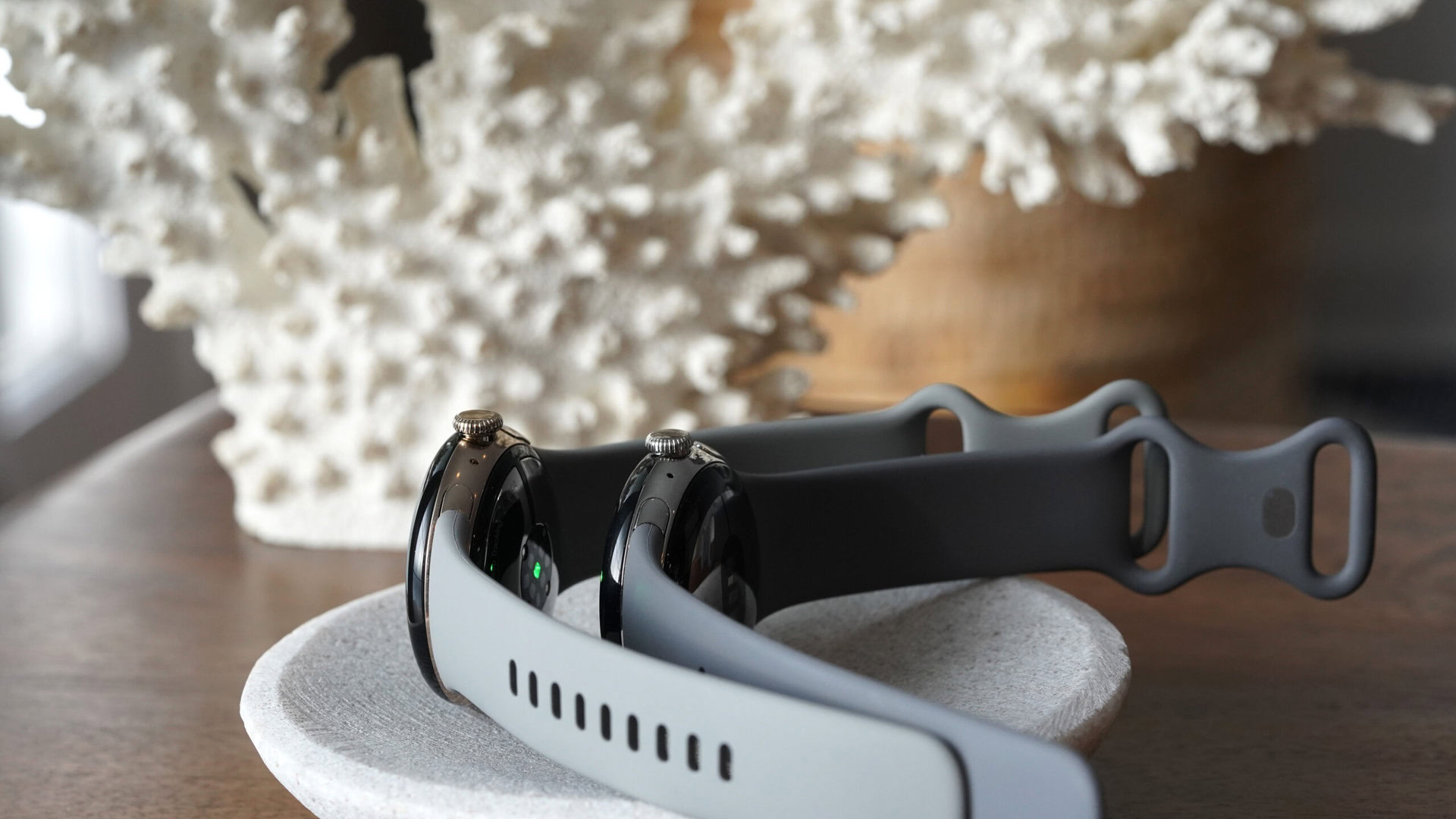
While I am generally a fan of the Google Pixel Watch line’s unique look, I don’t think the company is doing enough to cater to different buyers. To start, a single size doesn’t cut it. A petite 41mm case size is great for small wrists or anyone who prefers slim wristwear, but at the end of the day, it’s quite small. Most wearables measure around 45mm, and the most popular lines offer shoppers multiple options.
While strapping into my Venu 3S, I appreciate that I selected the low-profile size for dressy occasions. After a HITT workout with my 45mm Apple Watch Series 9, I’m glad I chose the large screen to fit stats. In both cases, the important point is that I was able to choose the size I wanted. While the Pixel Watch 2 technically fits my wrist well, I want more screen real estate to make the most of the device’s added fitness tracking features. I want bigger icons so I can haphazardly tap at menus and still get to the right screen. I want breathing room for watch face complications and larger maps when I miss my turn mid-run. I wouldn’t mind if those beefy bezels shrank, either.
In design, the single-sized Pixel Watch 2 doesn't have much to show after a year with user feedback.
Likewise, I am disappointed to see Google continue to offer only neutral metallics. The Pixel Watch case comes in polished silver, matte black, and champagne gold. A pop of color is an easy way to add interest to a watch family, and the domed impression is practically begging for a turtle-shell-green paint job. (That’s a color I just made up.) I appreciate that Google swapped out its stainless steel for recycled aluminum; I love the environment. I just wanted the company to do more to distinguish this year’s lineup as a second-generation design. (For the record, I don’t think the 10% lighter device feels any cheaper, and I’m always happy to cut weight on the wrist.)
More importantly, the increased durability of the watch’s thinner cover glass is hard to notice and even harder to celebrate without a viable way to repair the device affordably. As of now, if your watch is damaged, you can contact the Google Pixel Watch Customer Support Team to check your replacement options. Personally, that translates to me living in constant dread every time my watch makes contact with anything (which is often). So far, I have to say it’s survived my tests without any blemishes, but other reviewers have claimed less fortunate experiences.
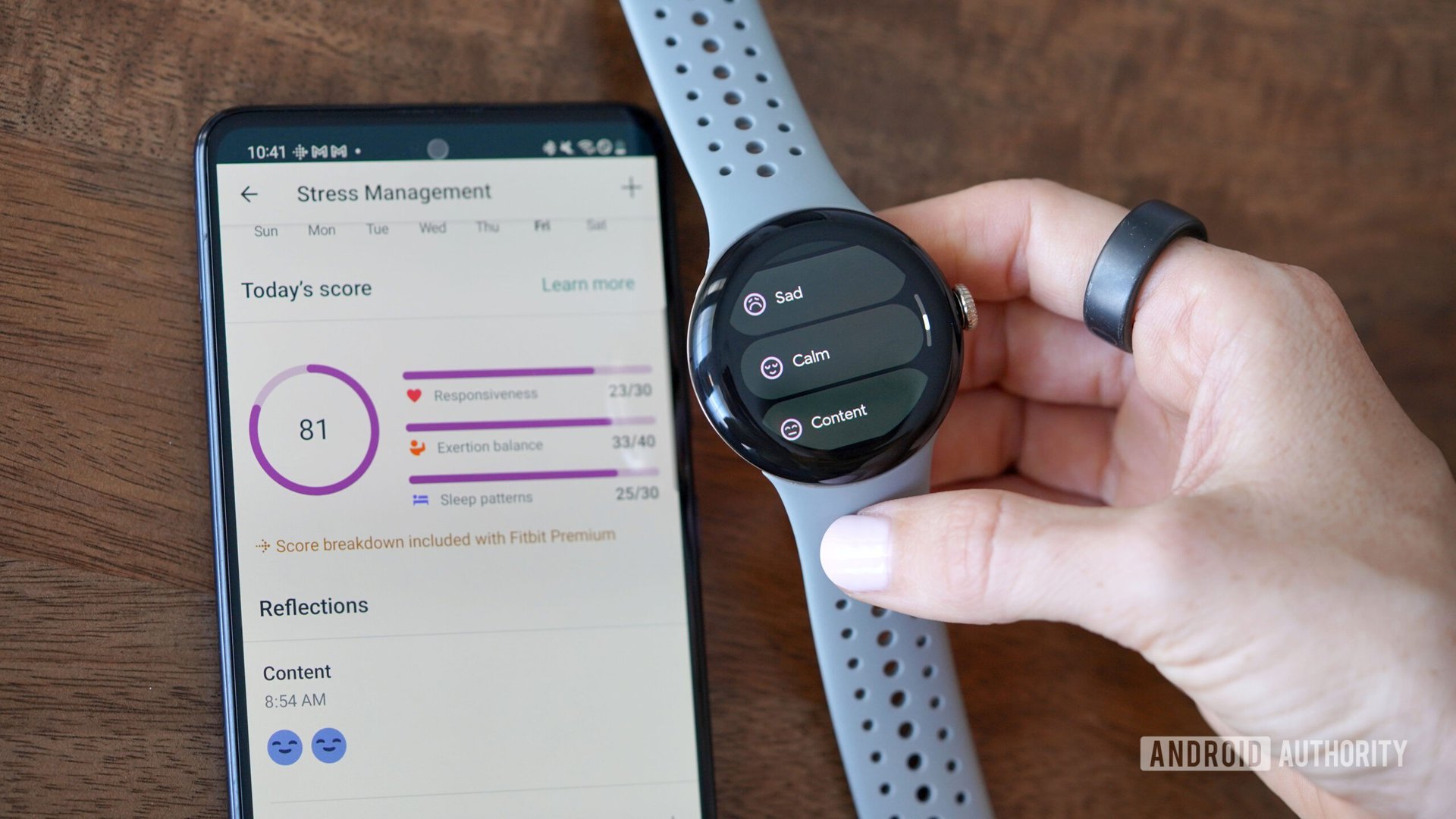
Speaking of stress, I am also not entirely sold on Fitbit’s stress management features. Like the Fitbit Sense 2, the Pixel Watch 2 features the company’s cEDA sensor, which tracks changes in electrodermal responses (tiny electrical changes on your skin) and offers continuous readings to monitor stress levels throughout the day. It prompts users to track their mood and suggests simple management tools, and each morning the device provides a stress management score.
My hesitation with this feature is two-fold and, admittedly, could be biased. The first is that I didn’t find the notifications accurate or effective. I received an alert once while literally standing in front of my fridge, sans any stress I could self-identify. I still chose to log my mood and was surprised to see how overly simplistic the process is. This feature needs a notes section, so I remember why I chose calm vs happy vs content. Was I stressed by work or a personal matter on Tuesday at 6:45 PM? I personally don’t find reflecting on past moods useful without context. Second, I’m not sure what to do with this data. Other companies do a better job of making stress-related stats digestible. After a week with the Pixel Watch 2, I feel more stressed about the stress feature than helped by it.
I appreciate the Pixel Watch 2's added health sensors, but I want better use cases, guidance, and insights.
I also don’t think Fitbit moved in the right direction with its recent app redesign. The Google-fied aesthetic oversimplified the interface, made important stats less glanceable, and detracted from the overall usefulness of the app. I’ve always considered Fitbit the approachable brand for those new to activity tracking, but I think this watered-down app takes that too far. I also loathe the lack of Dark Mode, especially first thing in the morning when checking my sleep data. Fortunately, the Pixel Watch 2 is compatible with enough third-party apps that anyone looking for a more detailed experience should be able to compensate.
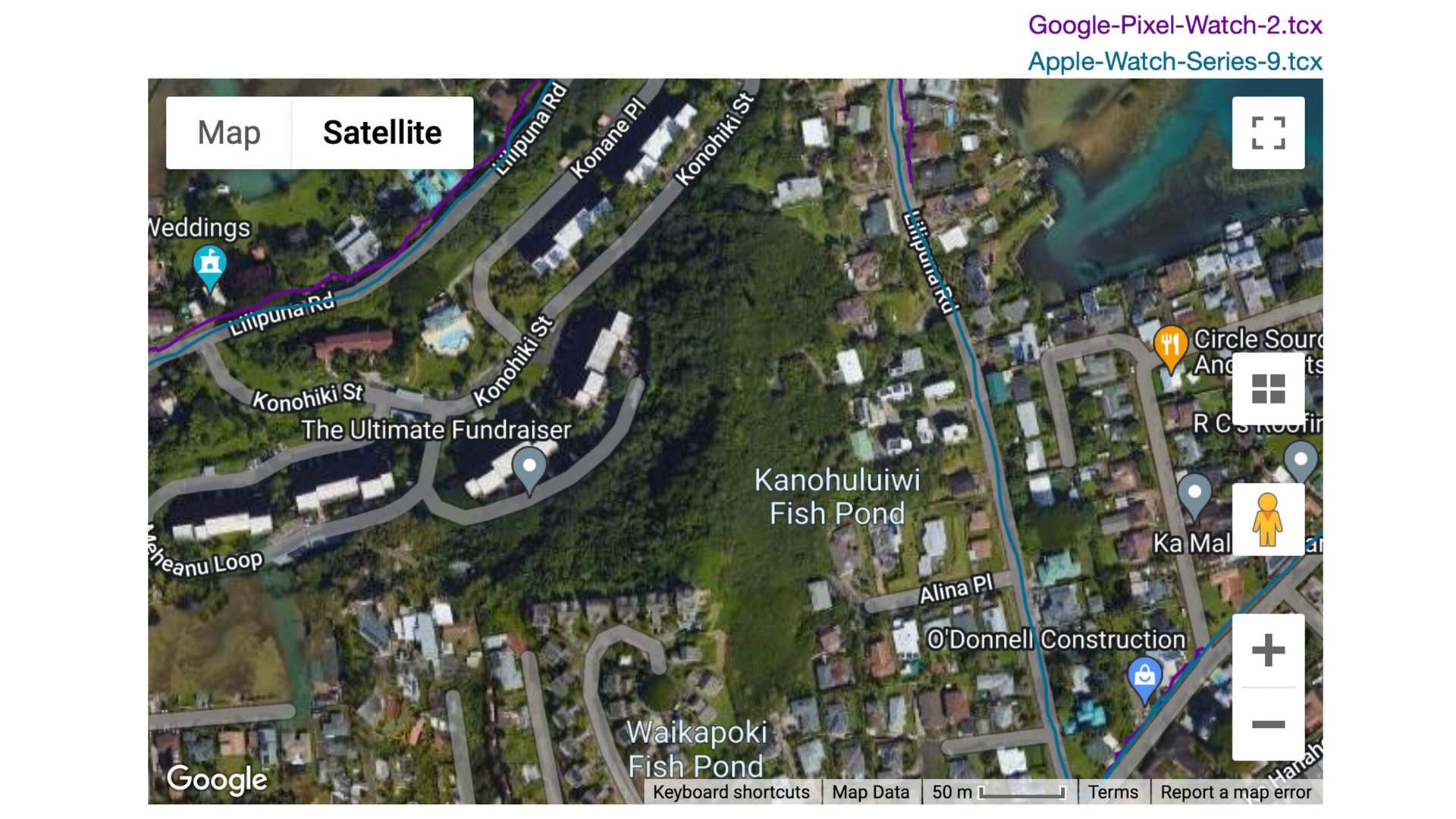
Unfortunately, even third-party apps depend on the device’s built-in GPS, which I found okay, but flaky. A few times, my total distances were inconsistent with other devices (by as much as 7%), despite my maps showing decent tracking. The weirdest data is pictured above, where the GPS disappears for a block yet still records a longer distance than my Apple Watch. Overall, I would rank the Pixel Watch 2’s GPS as okay but not great, or adequate for basic tracking (aka look I ran today) but not sharp enough for serious athletes. Still, I am hopeful this is a software issue rather than a sensor issue, and will continue to test over the coming weeks and months.
GPS accuracy is inconsistent, recording mostly accurate tracks but some inaccurate distances.
More frustratingly, the watch’s native workout app mysteriously failed to record one of my runs despite the GPS reading as connected and the workout screen running. Afterward, stats like steps and Activity Minutes were recorded, but no workout appeared. When you are trying to amass data for a review, this is heartbreaking. Another annoyance is that the watch saves every started workout despite how quickly you cancel. Other wearables recognize you didn’t work out and automatically delete the misfire.
Last but not least, setting up the Pixel Watch 2 is too convoluted. Fortunately, I review many devices yearly and know how to troubleshoot hiccups or anticipate weird settings. Yet I still had to reset this watch multiple times to get all my Google accounts in order and missed stats the first day because features were unexpectedly disabled. For average users, Google needs to do a better job onboarding and streamline the setup process.
Google Pixel Watch 2 specs
| Google Pixel Watch 2 | |
|---|---|
Display | Diameter: 41mm Always-on display Custom 3D Corning Gorilla Glass 5 320ppi AMOLED display with DCI-P3 color Brightness boost up to 1,000 nits |
Materials and finishes | 100% recycled aluminum Active band: Fluoroelastomer with soft-touch coating |
Dimensions and weight | Diameter: 41mm Height: 12.3mm 31g (without band) |
Chip | Qualcomm SW5100 Cortex M33 co-processor |
Storage and memory | 32GB eMMC flash 2GB SDRAM |
Power | 306mAh (typical) Up to 24 hours with always-on display USB-C Fast charging cable Promised charging speed: About 30 minutes to 50% About 43 minutes to 80% About 75 minutes to 100% |
Software | Wear OS 4.0 |
Sensors | Compass Altimeter Blood oxygen sensor Multipurpose electrical sensor Optical heart rate sensor Accelerometer Gyroscope Ambient light sensor Electrical sensor to measure cEDA Skin temperature sensor Barometer Magnetometer |
Interaction | Side button Haptic crown Premium haptics |
Audio | Built-in microphone Built-in speaker |
Features | Fitbit health and fitness Google Maps Google Wallet Google Assistant Messages and notifications YouTube Music NFC Emergency SOS International emergency calling Fall detection (up to 32 g-forces) |
Durability | 5ATM + IP68 |
Connectivity | 4G LTE and UMTS Bluetooth 5.0 Wi-Fi 802.11 b/g/n 2.4GHz NFC GPS, GLONASS, BeiDou, Galileo, Quasi-Zenith Satellite |
Compatibility | Android 9.0 or newer |
Band Size | Active band: Small: 130-175mm around Large: 165-210mm around |
What’s in the Box | Google Pixel Watch 2 Active band (small and large) USB-C Fast Charging Cable Quick Start Guide |
Warranty | US, CA, JP, India, Singapore, Taiwan, Indian: 1 year UK,EEA, France, Switzerland and AU: 2 years |
Colors | Matte Black Aluminum case / Obsidian Active band Polished Silver Aluminum case / Bay Active band Polished Silver Aluminum case / Porcelain Active band Champagne Gold Aluminum case / Hazel Active band |
Should you buy the Google Pixel Watch 2?
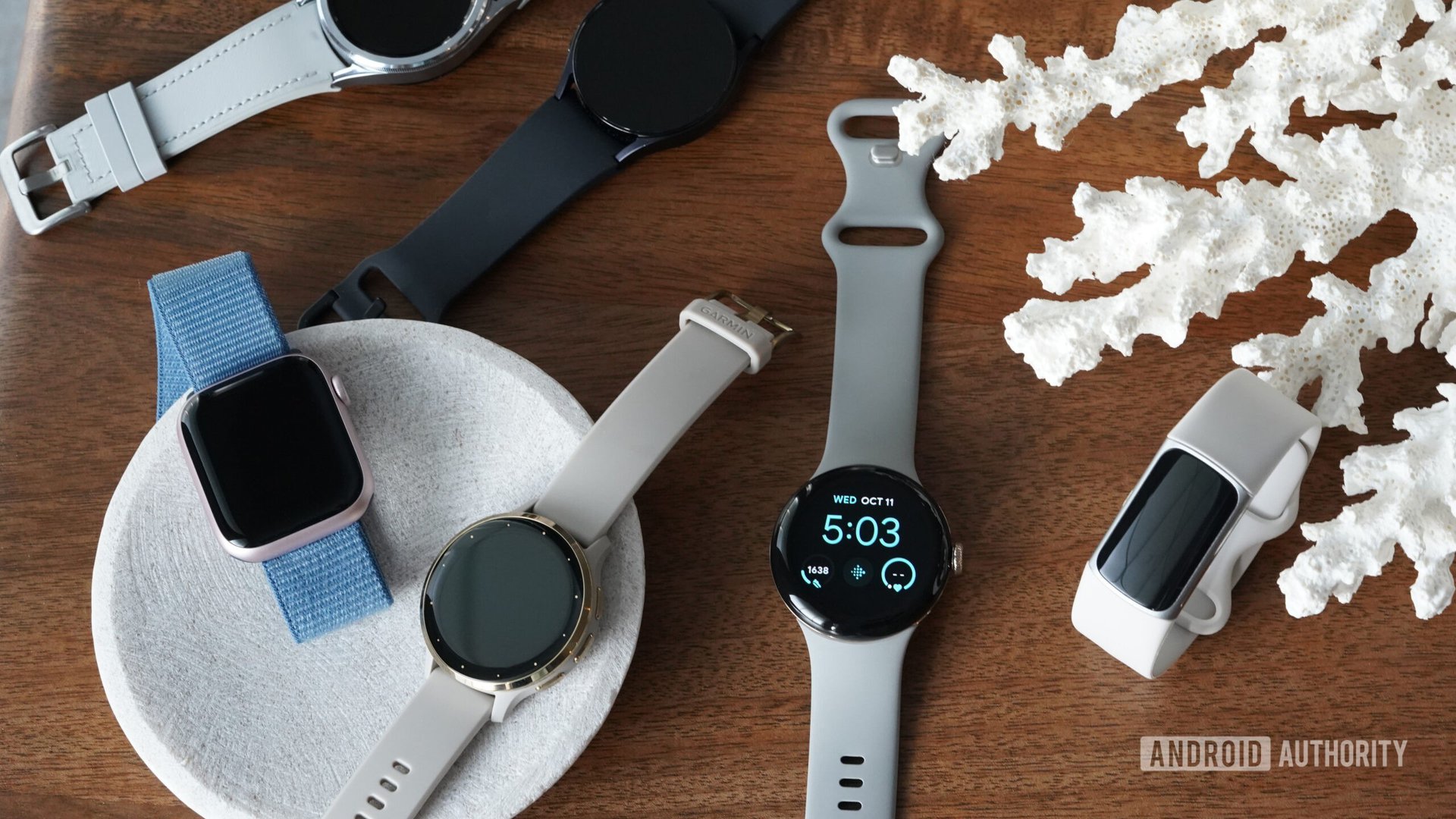
Last year, Google dropped its first-ever smartwatch touting a unique design, the best of Google Wear OS, and the fruit of its multi-billion dollar Fitbit acquisition. Yet, after years spent anticipating the device, most users were somewhat underwhelmed. Here at Android Authority, we acknowledged that Google laid solid groundwork and then immediately turned our sights toward what might come next.
The Pixel Watch 2 doesn’t catapult the brand to the top of the wearables market, but it does make key edits that elevate the Pixel Watch lineup. Wear OS 4 is powerful in raw form, the device’s heart rate sensor is top-notch, and fast charging makes the user experience much more manageable. Fitbit’s platform means solid activity and sleep tracking, while adding all the tools previously saved for the Fitbit Sense line means Google wants shoppers to know this is the best Fitbit smartwatch, hands down. In fact, given the butchering we’ve seen on the brand’s other lineups, this is the only logical pick for anyone interested in a Fitbit smartwatch.
The Pixel Watch 2 is definitely the better buy over its predecessor, and a Wear OS watch worth considering, especially for anyone who wants a Fitbit smartwatch.
With that said, the Pixel Watch 2 still isn’t perfect. Its battery life is improved but shorter than I’d like, it needs a second case size, and it still has some user experience quirks to iron out. In short, it’s still the product of a very young lineup, but one that carries the same premium price tag as elite smartwatches that have already matured. While you should absolutely choose the new model over the original if you specifically want a Google and/or Fitbit smartwatch, there are plenty of Pixel Watch 2 alternatives to consider before you part with your cash.
Compared to the Galaxy Watch 6 ($299.99 at Samsung) or Galaxy Watch 5 Pro ($374 at Amazon), the Pixel Watch 2 doesn’t offer as polished an experience, especially for Samsung phone users who benefit from some exclusive features. For iOS users, the Pixel Watch is not even an option, making the Apple Watch Series 9 ($389.99 at Amazon) the default pick. Nevertheless, comparing the Pixel Watch 2 vs Apple’s flagship shows Google still has a ways to go before it becomes a similar de facto pick, but for Android users.
If you’re committed to the Fitbit ecosystem but don’t need a full smartwatch experience, the Fitbit Charge 6 ($159.95 at Amazon) packs many of the same tracking tools at a lower price. It also boasts much better battery life and a handful of Google apps on a much smaller form factor. On the other hand, the best fitness-tracking smartwatch is Garmin’s Venu 3 ($449.99 at Amazon). Garmin’s platform has the most detailed training tools for athletes looking to strap into a well-rounded device. The Venu 3 also outperforms the Pixel Watch 2 in battery life and GPS accuracy. However, the Pixel Watch is available in both LTE and Wi-Fi only models, which the Garmin watch is not.
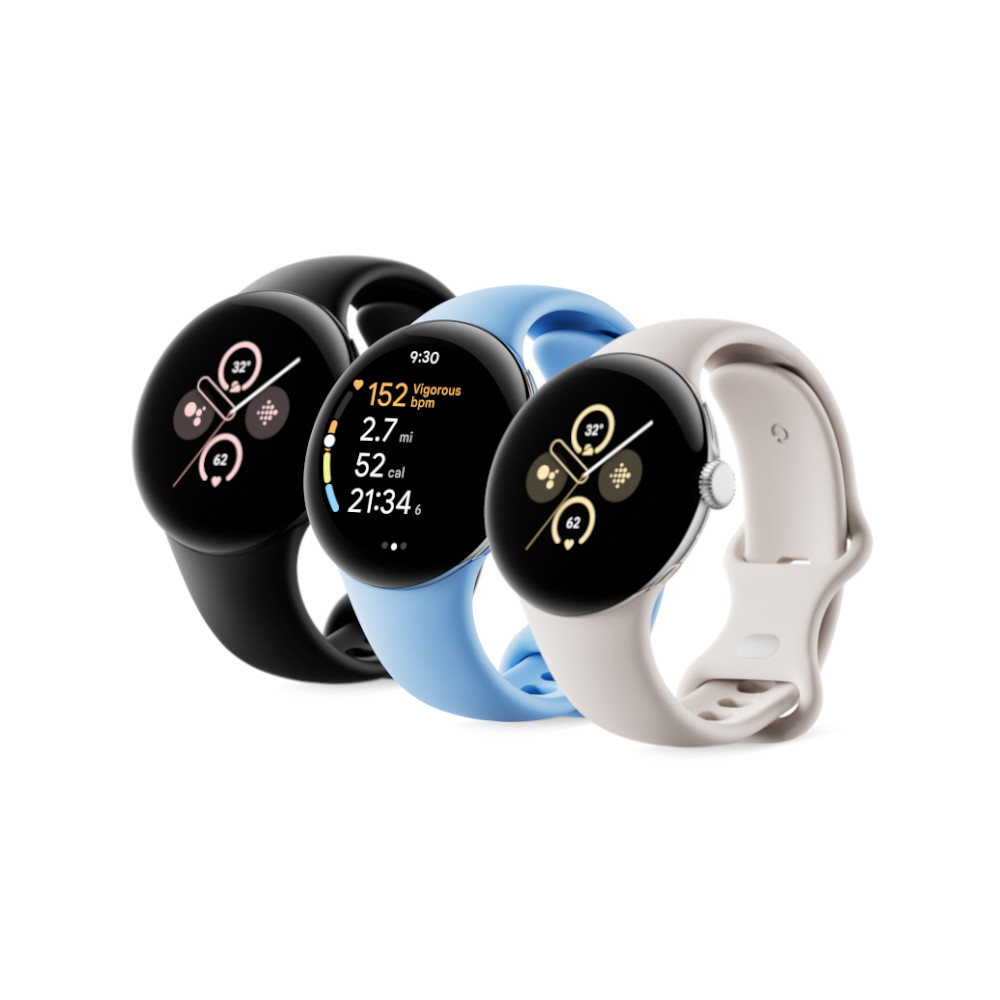
Google Pixel Watch 2 review: FAQs
The Google Pixel Watch 2 is IP68 certified for water and dust resistance and features a 5ATM rating making it water resistant in depths up to 50 meters.
The Google Pixel Watch 2 works with Samsung phones but does not work with iPhones.
You can send and receive text messages from an LTE Google Pixel Watch with an active cellular connection. With a Pixel Watch 2 Wi-Fi-only model, users can send and receive texts with a paired phone nearby.
The Google Pixel Watch 2 comes with a proprietary fast-charging cable. It does not come with a power adapter. Notably, the charger is not compatible with the first-generation Google Pixel Watch.
Yes, the Google Pixel Watch 2 has fall detection as well as additional safety features.
Yes, the Google Pixel Watch 2 features built-in GPS. The device supports GPS, GLONASS, BeiDou, Galileo, and Quasi-Zenith Satellite systems.